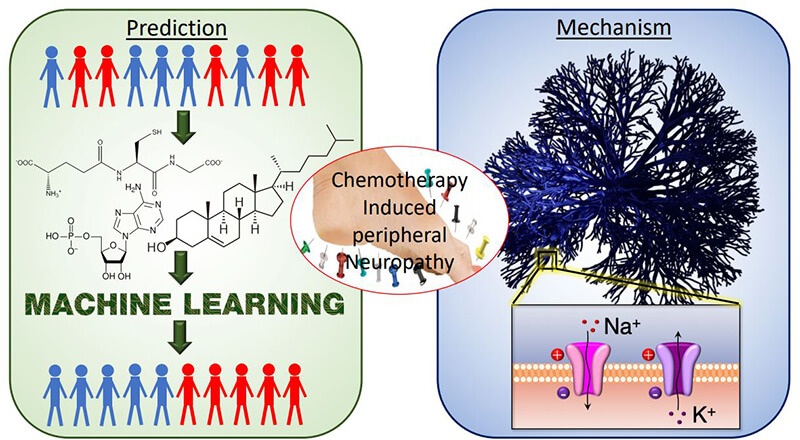December 2, 2019
An engineering approach to reduce the pain of chemotherapy
 Purdue University researchers are taking a closer look at the painful side effects from some chemotherapy treatments. (Stock photo)
Download image
Purdue University researchers are taking a closer look at the painful side effects from some chemotherapy treatments. (Stock photo)
Download image
WEST LAFAYETTE, Ind. – A study published in the American Journal of Managed Care states that the number of patients requiring first-line chemotherapy is expected to increase by more than 50%, from 9.8 million to 15 million, from 2018 to 2040.
One of the most common side effects for those undergoing chemotherapy is peripheral neuropathy, a set of symptoms caused by damage to nerves that control the sensations and movements of arms, legs, hands and feet. The issue can be so intense in children that they can have trouble with simple handwriting and walking.
Now, Purdue University pain researchers and engineers are working with medical experts at Riley Hospital for Children in Indianapolis, a metabolite profiling expert at Bindley Bioscience Center, and theoreticians at Max Planck Institute in Magdeburg, Germany. They are working to develop methods to better predict which patients will have side effects from specific chemotherapy drugs and develop therapeutic cures for it.
They have studied patient data to specifically look for biomarkers that are linked to chemotherapy-induced peripheral neuropathy. They developed machine learning models that can help in predicting this side effect during the early stage of chemotherapeutic treatment, and have developed a user-friendly tool to help physicians predict susceptibility of patients to neuropathy. More information about their work on predicting this side effect can be found at medRxiv.
“We are taking what we have already learned about pain sensation and applying it to a way forward toward more personalized medicine for chemotherapy patients,” said Parul Verma, a Ph.D. candidate in Purdue’s Davidson School of Chemical Engineering. “We take patient data and look for certain biomarkers that can significantly increase the likelihood of chemotherapy-induced peripheral neuropathy.”
The other members of the Purdue team include Doraiswami Ramkrishna, the Harry Creighton Peffer Distinguished Professor of Chemical Engineering, and Yang Yang, an assistant professor in Purdue’s College of Pharmacy. The have partnered with experts at Max Planck Institutes in Germany to study the mechanism of chemotherapy-induced peripheral neuropathy.
 This schematic shows the work on prediction and mechanism of chemotherapy-induced peripheral neuropathy. (Image provided)
Download image
This schematic shows the work on prediction and mechanism of chemotherapy-induced peripheral neuropathy. (Image provided)
Download image
Verma and Ramkrishna predict potential effects of a chemotherapy drug on a neuron that can induce peripheral neuropathy. Muriel Eaton from the Yang Yang lab validates the math model findings by recording electrical activity of neuron cultures.
“This is really about examining the mechanisms of neuropathy and other side effects and what happens to the neurons in the body due to chemotherapy,” Verma said. “Then, we can design drugs to treat cancer without causing the side effects or at least reduce the number or severity of side effects.”
The research being done by the Purdue team aligns with their other studies into pain and why some people experience it for most of their life and others rarely experience any physical pain due to specific genetic mutations. Verma, Ramkrishna and collaborators in Germany have developed a novel methodology using traditional mathematical tools to understand pain sensation. More information about this work is published on bioRxiv.
Health innovation is one of the key areas for the Purdue Research Foundation Office of Technology Commercialization, which supports commercializing, licensing and protecting Purdue intellectual property. For more information on licensing a Purdue innovation, contact the Office of Technology Commercialization at otcip@prf.org.
About Purdue Research Foundation Office of Technology Commercialization
The Purdue Research Foundation Office of Technology Commercialization operates one of the most comprehensive technology transfer programs among leading research universities in the U.S. Services provided by this office support the economic development initiatives of Purdue University and benefit the university's academic activities through commercializing, licensing and protecting Purdue intellectual property. Contact the Office of Technology Commercialization at otcip@prf.org. The foundation received the 2019 Innovation and Economic Prosperity Universities Award for Place from the Association of Public and Land-grant Universities. The Purdue Research Foundation is a private, nonprofit foundation created to advance the mission of Purdue University.
Writer: Chris Adam, 765-588-3341, cladam@prf.org
Source: Parul Verma, verma38@purdue.edu

